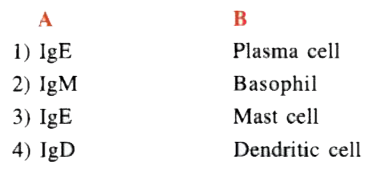An allergic reaction is initiated by antibodies of group
IgG
IgE
IgM
IgA
To determine which group of antibodies initiates an allergic reaction, we will analyze the different types of immunoglobulins (antibodies) mentioned in the question.
1. Identify the Types of Immunoglobulins:
- The question provides four options: IgG, IgE, IgM, and IgA. We need to evaluate each one to see which is involved in allergic reactions.
2. Evaluate IgG (Immunoglobulin G):
- IgG is the most abundant immunoglobulin in the blood.
- Its primary function is to cross the placenta and provide passive immunity to the fetus.
- Conclusion: IgG is not involved in allergic reactions.
3. Evaluate IgE (Immunoglobulin E):
- IgE is present in very low concentrations in the blood compared to IgG.
- It binds to receptors on mast cells and basophils.
- When an allergen is encountered, IgE mediates allergic responses and inflammation.
- Conclusion: IgE is the antibody specifically involved in allergic reactions.
4. Evaluate IgM (Immunoglobulin M):
- IgM is a pentameric antibody and is the first antibody produced in response to an infection.
- It plays a crucial role in the initial immune response but is not specifically involved in allergies.
- Conclusion: IgM is not involved in allergic reactions.
5. Evaluate IgA (Immunoglobulin A):
- IgA is known as secretory immunoglobulin and is found in various secretions such as saliva, tears, and breast milk.
- It plays a role in mucosal immunity but does not directly mediate allergic responses.
- Conclusion: IgA is not involved in allergic reactions.
6. Final Conclusion:
- Based on the evaluations, the correct answer is IgE (Immunoglobulin E), as it is the antibody that initiates allergic reactions.
Final Answer:
The correct option is IgE (Immunoglobulin E).
---
- The question provides four options: IgG, IgE, IgM, and IgA. We need to evaluate each one to see which is involved in allergic reactions.
- IgG is the most abundant immunoglobulin in the blood.
- Its primary function is to cross the placenta and provide passive immunity to the fetus.
- Conclusion: IgG is not involved in allergic reactions.
- IgE is present in very low concentrations in the blood compared to IgG.
- It binds to receptors on mast cells and basophils.
- When an allergen is encountered, IgE mediates allergic responses and inflammation.
- Conclusion: IgE is the antibody specifically involved in allergic reactions.
- IgM is a pentameric antibody and is the first antibody produced in response to an infection.
- It plays a crucial role in the initial immune response but is not specifically involved in allergies.
- Conclusion: IgM is not involved in allergic reactions.
- IgA is known as secretory immunoglobulin and is found in various secretions such as saliva, tears, and breast milk.
- It plays a role in mucosal immunity but does not directly mediate allergic responses.
- Conclusion: IgA is not involved in allergic reactions.
- Based on the evaluations, the correct answer is IgE (Immunoglobulin E), as it is the antibody that initiates allergic reactions.
The correct option is IgE (Immunoglobulin E).
Topper's Solved these Questions
- HUMAN HEALTH AND DISEASE BOOK - ICSECHAPTER - HUMAN HEALTH AND DISEASE EXERCISE - COMPETITION CORNER (OBJECTIVE TYPE QUESTIONS) (Multiple Choice Questions)
68 Videos
- HUMAN HEALTH AND DISEASE BOOK - ICSECHAPTER - HUMAN HEALTH AND DISEASE EXERCISE - COMPETITION CORNER (OBJECTIVE TYPE QUESTIONS) (Assertion and Reason Type Questions (For AIIMS aspirants))
28 Videos
- HUMAN HEALTH AND DISEASE BOOK - ICSECHAPTER - HUMAN HEALTH AND DISEASE EXERCISE - PREVIOUS YEARS. BOARD PAPER QUESTIONS (Long Answer Type Questions)
27 Videos
- EVOLUTIONBOOK - ICSECHAPTER - EVOLUTIONEXERCISE - COMPETITION CORNER (Assertion and Reason Type Questions (For AIIMS aspirants))
26 Videos
- HUMAN REPRODUCTIONBOOK - ICSECHAPTER - HUMAN REPRODUCTIONEXERCISE - SOURCE BASED QUESTIONS
22 Videos
Similar Questions
Antibody
View SolutionA hydrogen like atom of atomic number Z is in and excited state of quantum number 2n. It can emit a maximum energy photon of 204 eV. If it makes a transition to quantum state n, photon of energy 40.8 eV is emitted. Find n , Z and the gound state energy (in eV) for this atom, Also calculate the minimum energy (in eV) that can be emitted by this atom during de-exitation, Ground state energy of hydrogen atom is 13.6eV
View SolutionAntibody is
View SolutionThe antibodies are
View SolutionAn allergic reaction that is hereditary is
View SolutionAllergic reaction involves binding of A antibodies to B cells.

View SolutionLysis of foreign cell is initiated by antibodies of:
View SolutionAn antibody is a
View SolutionAn antibody is a
View SolutionMainly allergic reactions occur in
View Solution
